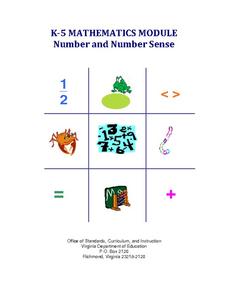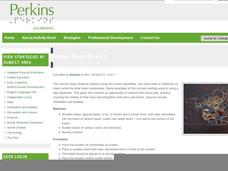Curated OER
Directions Test
Have your pupils really been reading the directions? Find out with this tricky little test. The first instruction is to read all of the directions quickly, but you'll find that quite a few pupils start acting rather funny just a few...
Perkins School for the Blind
Following Directions
Turn the act of following directions into a fun and engaging game! Especially designed for students with cognitive or intellectual disabilities, this lesson uses a game format as a natural reinforcer. Write a set of directions onto a set...
Physics Classroom
Vector Direction
Scholars practice vector direction notation in multiple formats. After mastering each individually, they work to convert from one to another as one part in a series of lessons on vectors and projectiles.
Curated OER
Using Four Main Directions in the Classroom
Students identify the four cardinal directions. In this map skills geography lesson, students use a magnetic compass to label the four directions in the classroom. Students use the four directions to locate objects in the classroom.
Curated OER
Using the Four Main Directions in the Classroom
Students utilize a compass to determine where North is in the classroom. In this direction lesson, students label the four main directions. Students locate features in the classroom and describe the directions to get to them. Students...
Curated OER
Using 4 main directions in a classroom
Learners use the four directions of a compass rose to locate classroom features. In this directions lesson plan, students locate the features by identifying directions.
Core Knowledge Foundation
Kindergarten Skills Unit 1
A unit focuses on prewriting skills. Over 10 days, young scholars practice drawing lines and shapes, use play dough to build shapes, and track from left to right. Pupils put their sense of hearing to the test by listening for words...
Curated OER
Directional Terms
Students identify and demonstrate various locational terms, and examine how a globe is a model of Earth. They repeat words and movements for various finger plays to demonstrate locational terms, play directional words games, and sing a...
Curated OER
Sequential Directions
Students demonstrate how to give clear directions when drawing a map to a specific location. In this map skills lesson, students create a map to a location, such as their school, and write down clear directions to the destination.
Pearson Longman
Back Talk: A Summarizing Activity
Here's resource that presents step-by-step directions for three different activities that ask kids to read a short passage, listen for the main points, and then to summarize the passage in their own words.
Curated OER
Physical Education Lesson Plan: Fortune Cookies
Students investigate movement. In this physical education lesson, students select a "fortune cookie" made from crumpled paper and read the directions inside. Students perform locomotor skills by following the oral directions...
Curated OER
Following Plans
Students learn to follow a specific plan in order to do something or get somewhere. In this following directions activity, students explore key vocabulary related to following plans, complete fun activities that require attention to...
Curated OER
K-5 Mathematics Module: Number and Number Sense
Reinforce number sense with a collection of math lessons for kindergarteners through fifth graders. Young mathematicians take part in hands-on activities, learning games, and complete skills-based worksheets to enhance proficiency...
Curated OER
How to Bounce a Ball
Students practice bouncing a basketball with their right and left hands as well as running while bouncing.
Curated OER
Roaming Robot
Learners give directions to help a classmate find an object. In this direction lesson, students tell the finder where to travel and how many steps to take. More difficult directions include angled turns.
Curated OER
Literacy Map Activity
Students write directions using maps and ad, they define driving directions and convert cardinal numbers to there ordinals. They write directions which are given orally in these multi-level literacy activities.
Perkins School for the Blind
The Country Egg
Because most children with visual impairments don't reach and grab things at a young age the way sighted children do, they need additional supports to build up their fine motor skills. Here, they work on the pincer grasp, using their...
Perkins School for the Blind
Rubber Band Stretch
If you don't teach blind or visually impaired students, this instructional activity may seem a bit strange. But, it helps them develop motor skills, orientation and movement skills, and listening skills, while building a better...
West Contra Costa Unified School District
Simplifying Fractions Activity
Warm-up pupils' fraction muscles with a four-question quiz, then delve into a learning game designed to reinforce the concept of simplifying fractions. Based on the "I do, We do, You do" method of teaching, the lesson directly...
Perkins School for the Blind
Where Shall I Put It?
Position and positional phrases are concepts that need to be constructed for learners with low or no vision. Help them gain competence and a conceptual understanding of words like on, in, and under with a funny game. After gathering a...
Physics Classroom
Momentum
Interactive emphasizes understanding magnitude of momentum vectors depends upon mass and velocity, while the direction of the vector only relates to the direction of movement. As part of the larger series on momentum and collision, three...
Illustrative Mathematics
Ordering Numbers
Deepen the number sense of young mathematicians with this unique ordering exercise. Given a list of the numbers 1, 5, 10, 50, and 100, young learners must determine where the numbers from a second list fit in the sequence. To increase...
Physics Classroom
Free Fall
Scholars must understand freefall before they learn how objects like airplanes fly. They apply knowledge of velocity and acceleration to predict speed and direction as part of a larger series on vectors and projectiles.
Physics Classroom
Acceleration
The acceleration rate of a flea jumping works out to 50 times faster than the acceleration rate of the space shuttle. Pupils apply knowledge of acceleration to dot diagrams, velocity-time tables, and word problems. They solve for...























